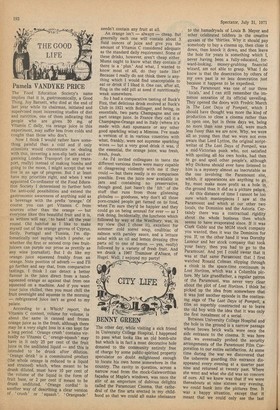THE GOOD LIFE Pamela VANDYKE PRICE
The Food Education .Society's name implies that it is, gastronomically, a Good Thing. Joy Barnett, who died at the end of last year while its chairman, initiated and supervised most interesting studies of diet and nutrition, one of them indicating that people who are given 50 mg. of Vitamin C daily, via orange juice in this experiment, may suffer less from colds and coughs than those who don't.
Now I think I would rather have something painful than a cold and if only scientists would concentrate on dealing with this, inventing a non-slip bath and organising London Transport (or any transport, really) instead of making bombs and going to the moon, I might accept that we live in an age of progress. But I at least have my priorities right, and when I was appointed Co-ordinator of the Food Education Society I determined to further both the anti-cold possibilities and extend the gastronomic awareness of anything sold as a beverage with the prefix 'orange.' Of course you can get Vitamin C from sources other than the orange — but everyone likes this beautiful fruit and it is, as writers will say, 'to hand' all the year round. Old habitue as I like to make myself out of the orange groves of Cyprus, Sicily, Portugal and Tunisia, I'm diplomatically not saying which I prefer, or whether the first or second crop (we fruitjuicers can purple our prose as prettily as any wine journalist). But I do like my orange juice squeezed freshly from an orange. Note position of adverb — and I'll go further and say that, from comparative tastings, I think I can detect a better flavour in the juice direct from a handsqueezed orange as against that from one squeezed on a machine. And if you want your juice chilled, then you must chill the fruit overnight and squeeze in the morning — refrigerated juice isn't as good to my palate.
According to a Which? report, the Vitamin C content, volume for volume, is about the same in canned and frozen orange juice as in the fresh, although there may be a very slight loss in a can kept for a long period. Orange crush' contains virtually no Vitamin C, 'orange-squash' may have in it only 25 per cent of the fruit juice in the undiluted liquid — and this is intended to be drunk after dilution. 'Orange drink' is a comminuted product (the whole orange is reduced to a liquid and strained) which, when meant to be drunk diluted, must have 10 per cent of the volume of the liquid in the form of fruit base, or 2 per cent if meant to be drunk undiluted. 'Orange cordial' is another way of describing a clear version of ' crush ' or ' squash '. ' Orangeade ' needn't contain any fruit at all.
An orange isn't — always — cheap. But generally each one will contain about 3 fluid ounces of juice and give you the amount of Vitamin C considered adequate as the standard daily requirement. Some of these drinks, however, aren't cheap either. Mums ought to know what they contain if there is a 'plus.' And what, I wanted to know most ol all, do they taste like? Because I really do not think there is anything which I would find unacceptable to eat or drink if I liked it. One can, after all, fling in the odd pill at need if nutritionally weak somewhere.
So I had a comparative tasting of Buck's Fizz, that delicious drink evolved at Buck's Club in 1921 with Bollinger, and being, in essentials, two parts Champagne and one part orange juice. In France they call it a Champagne-Orange and in Italy (where it's made with Asti spumante or any other good sparkling wine) a Mimosa. I've made a version of it in various countries with what, frankly, were not supreme sparkling wines — but a very good drink it was, if the essential, the orange juice, was fresh, fresh, fresh.
As I'd invited colleagues to taste the different versions there were many capable of disagreeing violently with me if they could — but there really is no comparison possible. Even the juice now available in jars and containing no preservative, though good, just hasn't the 'lift' of the stuff that runs from those glistening globules — goodness, why don't all those porn-crazed people get turned on to food, when I'm sure they'd be happier and they could go on being sensual for ever — as I risk doing. Incidentally, the luncheon which followed by way of the Westbury, was, in my view (but I chose it), excellent for summer: cold sorrel soup, coulibiac of salmon with parsley sauce, and a lettuce salad with an oil and lemon dressing (five parts oil to one of lemon — yes, really) followed by a variety of fresh fruit. And we drank a 1967 Traminer d'Alsace, of Hugel. Well, I enjoyed my party!
C.










































 Previous page
Previous page